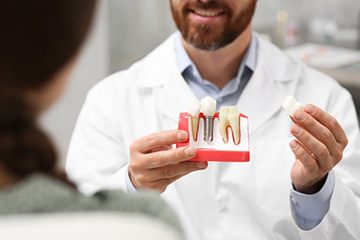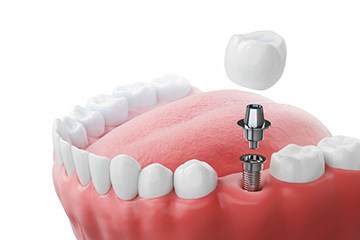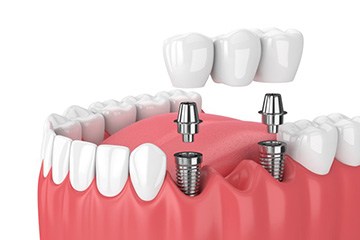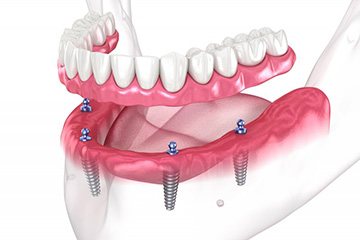Dental Implants — Tustin, CA
State-Of-The-Art Tooth Replacement
Missing teeth can make it painful to chew your favorite foods, and the gap in your smile can crush your confidence, but there is hope for your smile! Using state-of-the-art dental implants in our Tustin dental office, we can restore comfort and function and give you back your beautiful, confident smile.
Replacing missing teeth at Zhang Dental Group of Tustin is important for your comfort and oral health, and dental implants can be the perfect solution. If you need treatment for tooth loss and want the most complete and stable solution available, dental implants might be the perfect answer! To learn more about this method of tooth-replacement, continue reading or give our office a call today.

Why Choose Zhang Dental Group of Tustin for Dental Implants?
- Start-to-Finish Convenience
- Advanced Dental Technology
- Insurance-Friendly Dental Practice
What Are Dental Implants?

A dental implant is an artificial tooth root that’s surgically inserted into the jawbone, allowing you to enjoy unmatched stability and durability. Since it’s made of biocompatible titanium, it’ll naturally fuse with the surrounding bone tissue over time. Once you’re all healed up, your implant will be used to support a customized crown, bridge, or denture. They’ll look and feel extremely natural!
The 4-Step Dental Implant Process

Dental implants differ from dentures and dental bridges, so their treatment process is a bit more complex. That said, rest assured – the many benefits of these posts are worth the time and effort! Our office does the whole treatment in-house, ensuring your final implants are well-placed. That means your care will benefit from Dr. Zhang and his years of experience. With him at the helm, you can expect the following: consultation, surgery, osseointegration, and delivery of the final restoration.
Initial Dental Implant Consultation
Before we place any dental implants, you’ll meet Dr. Zhang for a consultation. This talk lets us learn about your treatment goals, oral health, and other relevant factors. Once it’s over, we’ll use its findings to see if implants suit you and adjust your final treatment plan.
If we decide you don’t qualify for dental implants, don’t panic. You can become a good candidate later through extra dental work – gum disease treatment, tooth extractions, etc. After those procedures, your mouth will be healthy and strong enough for dental implants.
Dental Implant Surgery
Rather than send you away, Dr. Zhang will perform your dental implant surgery in-house. This setup will reduce your treatment time and ensure you get precise results. After all, we’ll likely have access to your dental records – our team will know exactly how and where to place your implants.
Your implant surgery will involve several key steps. Dr. Zhang will first numb the treatment site, keeping it from feeling pain during his work. He’ll then make a small incision in your gums to make room for the final dental implant. Next, Dr. Zhang will place the implant precisely before suturing your gums shut. The final step will be to put a protective cap over your now-set implant post.
Dental Implant Osseointegration & Abutment
Your new dental implant will start to fuse with your jaw after the surgery. This fusion process (i.e., osseointegration) should take 4-6 months, and it’ll secure your implant post. The result will be that your new “tooth” becomes a permanent part of your mouth and remains stable.
Our practice will do a follow-up surgery once you’ve healed from implant fusion. At that point, we’ll place an abutment – a metal connector – on your implant that will secure the restoration. A dental lab will craft the final prosthetics while you recover from this secondary surgery.
Delivery of Dental Implant Restoration(s)
For the last part of your implant treatment, we’ll set or “deliver” your final restoration. That means we’ll place a dental prosthetic that “matches up” with how many teeth you’ve lost. Depending on the number, this prosthetic could be a dental crown, bridge, or implant denture.
Thankfully, it shouldn’t take long to fit the final restoration; we’ll just apply some dental cement. Our team will then make last-minute changes to ensure quality results. From there, you can enjoy your restored smile and its many perks!
Benefits of Dental Implants

Dental implants are a wildly popular way to replace missing teeth and have quickly become the gold standard for many dental practices. Unlike dentures or bridges, implants can fuse directly with your jawbone providing many benefits that traditional tooth replacements just can’t match! At Zhang Dental Group of Tustin, we’ve seen how implants have changed the lives of our patients. So, we want to spread the word about these exciting smile solutions! Read more below to see how dental implants could be the restorative treatment you’ve been looking for.
Day-to-Day Benefits

Dental implants are the most non-invasive tooth replacement options available, fitting seamlessly into your smile. Because they function like real teeth, you can enjoy many smaller benefits that will be apparent right away, such as:
- Enjoying All Your Favorite Foods: Nothing is “off-limits” with dental implants when it comes to your favorite meals and snacks.
- Improved Speech and Clarity: Speak clearly and confidently, thanks to a secure fit that never slips or feels bulky.
- Easy Oral Care: Say goodbye to adhesives or special cleaning routines—just brush and floss like regular teeth!
Health Benefits

Dental implants don’t just restore your smile; they also protect your oral health in many ways that you may not realize. For example, they can:
- Prevent Jawbone Loss: Implants prevent the deterioration of your jawbone by stimulating it just like natural tooth roots.
- Improve Nutrition and Digestion: Dental implants fill gaps and secure your teeth so you can chew your food properly and eat a wider variety of meals. This prevents issues like indigestion and vitamin deficiencies.
- Preserve Oral Health: Unlike traditional bridges, dental implants don’t require altering neighboring teeth. This helps keep your remaining teeth healthy and strong.
Long-Term Benefits

The long-term benefits are the ones that are the hardest to see at first, but they are some of the most exciting! Here’s what you can look forward to:
- A High Success Rate: Dental implants are planned with precision and made from durable materials like titanium and ceramic. This gives them a success rate of over 95 percent—one of the highest of all procedures.
- Save Money: Despite the upfront cost, dental implants are one of the most solid investments you can make for your smile. They don’t need frequent replacements and will more than pay for themselves over time.
- Boosted Confidence: Restoring your smile with attractive dental implants will not only look great now but will also preserve your face as you age. This can keep your confidence high for decades to come.
Who Dental Implants Can Help

Dental implants can help with a wide variety of situations, such as replacing a single tooth or an entire arch of missing teeth. Our team will need to evaluate your oral health and jawbone to ensure that this treatment is a viable option for you before moving forward. Afterward, we can develop a personalized plan to help renew your bite.
Who Is a Good Candidate for Dental Implants?

As long as you’re an adult who is missing any number of teeth, you might be eligible for undergoing dental implant treatment. That said, here are certain criteria that you’ll have to meet to be considered a good candidate for the procedure:
- Great Oral Health: We’ll have to make sure that you’re completely free of any complications that can risk failure later on, such as decay, gum disease, or infection.
- Good Overall Health: Since you’ll be undergoing a minor oral surgery, you’ll need to be in good shape so that you can have a successful recovery.
- Sufficient Jawbone: To properly support your dental implant(s), we’ll need to make sure you have enough jawbone density.
Even if you don’t meet the requirements right now, our team can provide you with preliminary services so that you can be prepared to undergo dental implant treatment. These may involve tooth extractions, gum disease treatment, or bone grafting. After you’ve completed any necessary procedures, we can move forward with placing your metal posts.
Missing One Tooth

If you’re missing a single tooth, then we’ll likely provide you with just one titanium post. This implant will be embedded into your jawbone to create your new tooth root so that your dental crown can remain in place indefinitely. Not only will you be able to enjoy a natural feeling and comfortable bite again, but your implant will also help preserve the rest of your jaw and facial shape.
Missing Multiple Teeth

Those who are missing two or more teeth in a row might have an implant bridge placed. This solution involves using two titanium posts at both ends of the gap, which will then be connected via artificial teeth to complete the bridge. This tooth replacement provides greater stability compared to traditional bridges, and they also don’t require any alterations to your natural teeth.
Missing All Teeth

When there’s an entire arch of missing teeth, traditional dentures won’t be your only solution for rebuilding your smile. Our team can offer implant dentures that utilize 4 to 6 dental implants to support your prosthetic directly to your jawbone. The results include a much more secure solution for your bite, and you can enjoy your new pearly whites for decades to the rest of your life as long as you practice proper care.
Maintaining & Caring for Your Dental Implants

A dental implant securely placed in your jaw can last a lifetime if you care for it properly. The biggest threat to the longevity of your implant is periodontal disease, so it’s crucial to focus on your gum health.
This includes brushing at least twice a day, flossing once, and visiting our dentist for teeth cleanings and exams every six months or as recommended.
If this all seems a bit complicated, rest assured that Dr. Zhang will spend all the time needed to explain the steps involved and what you can expect from treatment. Our professional team is proud of the results we accomplish for our patients and won’t be satisfied until we know that you are delighted with the outcome!
Dental Implant FAQs

Missing teeth can affect more than just your appearance – it can negatively affect your overall quality of life. Fortunately, you can replace the gaps in your smile with dental implants in Tustin. Since the process involves oral surgery, it’s completely normal to have several lingering questions in mind before moving forward with treatment. For your convenience, our team at Zhang Dental Group of Tustin has decided to answer some frequently asked questions below. Should you not find what you’re looking for, feel free to reach out directly to our office!
Does Getting Dental Implants Hurt?
Before the procedure begins, your mouth will be fully numbed with a local anesthetic. You’ll also most likely be sedated, which will lower your body’s ability to register pain. Although the surgery itself shouldn’t hurt, your mouth may be sore for a few days afterward. Luckily, you can manage these symptoms by taking over-the-counter or prescribed pain medication and using cold compresses. If your discomfort doesn’t improve after two or three days, you should contact us for further assistance.
Are Dental Implants Safe?
Absolutely! When placed by a qualified professional, dental implants are extremely safe and successful. If you have preexisting issues like low jawbone density or gum disease, we’ll address these problems first to make implant surgery less risky. You should let us know if you have health conditions like diabetes, cancer, or anything else. Since these can make your surgery and healing process riskier, we’ll need to discuss a game plan during your consultation to ensure your treatment goes smoothly.
What Can Cause Dental Implants to Fail?
Dental implant failure can occur because of peri-implantitis and failed osseointegration. Peri-implantitis is a type of gum disease that develops from poor oral hygiene, damaging the bone and gums supporting the implant. Meanwhile, failed osseointegration is when the implant doesn’t successfully integrate with the surrounding bone tissue. Some other causes of dental implant failure include chronic teeth grinding, tobacco use, poor oral hygiene, and certain medications. During your consultation, Dr. Zhang will provide guidelines for minimizing your risk of implant failure.
Will I Have to Take Off Work for Dental Implant Surgery?
On average, patients usually need to take about one to two days off of work after getting dental implants. However, it depends on your unique case. Dr. Zhang will recommend the number of days you should take off based on your specific situation. If your job is physically demanding, you may want to take at least three to four days off. Strenuous exercise could divert blood from the implant site and delay healing.

